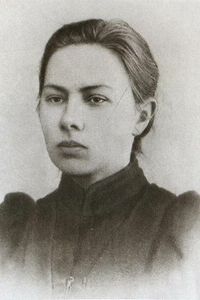Nadezhda Konstantinovna Krupskaya, a renowned Russian Bolshevik, was born on February 26, 1869, Old Style, and passed away on February 27, 1939. As the wife of Vladimir Lenin, she played a significant role in the Russian Revolution and subsequent Soviet era.
Krupskaya's early life was marked by poverty, as her noble family had fallen on hard times. This experience instilled in her a strong desire to improve the lives of the poor, which would become a defining characteristic of her later work. Her involvement in Marxist discussion groups led her to meet Lenin, and they were eventually allowed to join him in exile in Siberia, on the condition that they marry. Although their union may have been seen as a marriage of convenience, they remained devoted to one another throughout their lives.
Following the 1917 Revolution, Krupskaya emerged as a prominent figure in the Soviet political scene. Between 1922 and 1925, she allied herself with Stalin, Zinoviev, and Kamenev against Trotsky's Left Opposition. However, she later clashed with Stalin, marking a significant shift in her political affiliations.
Krupskaya's influence extended beyond politics, as she was appointed deputy education commissar from 1929 to 1939. During this period, she wielded considerable power over the Soviet educational system, including the development of Soviet librarianship. Her legacy as a champion of education and literacy continues to be celebrated to this day.





















